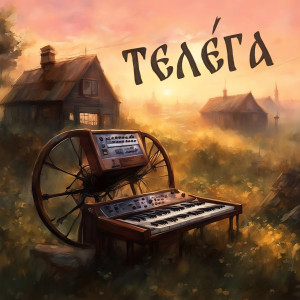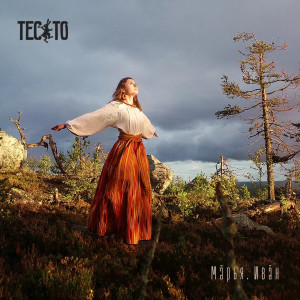 Here are three albums from the 2024 Russian World Music Chart.
Here are three albums from the 2024 Russian World Music Chart.
The music on Telega bridges the folk music of the Perm region of Russia, modern ethno-folk, and musical theater. The songs, most of them dance and other social occasion songs collected from around the Perm and neighboring regions, were arranged and largely played by the well known musical theater composer Nikita Savostin, and sung by members of the Perm City vocal group Ensemble Voskresenie.
The music encompasses multiple genres as settings for the vocals of the ensemble — Anna Surikova, Polina Kalinina, Yulia Mezhevskaya, Valeria Boyarshinova — who have been performing together since 2002. This is their first album in which they’ve collaborated with Savostin. In addition to arranging and producing, Savostin plays violin, keyboards, guitars, percussion, and balalaika on the album. Additional musicians contribute guitars, bass, drums, saxophone, balalaikas, bouzouki, flutes and whistles, bagpipes, percussion, violin, and keyboards.
The ensemble mostly sing together with occasional solos or call-and-response, in a way that blends Nordic, Slavic and sometimes Balkan styles of women’s polyphony. It’s emotive and often highly energetic, although the slower pieces are no less stirring. It’s unclear whether the music has a religious component to it. The ensemble’s name Voskresenie means “resurrection,” and one of the songs, “Poydem devki lugom” (Let’s go, girls, to the meadow), a calendar song from the Smolensk, incorporates the melody of “Amazing Grace.”
Savostin’s arrangements sometimes are a bit “kitchen sink,” with a strong folk-rock element but also a lot of jazz, soul, funk, progressive rock, and “ethno-fusion.” For the most part it all works together nicely, although sometimes the production threatens to overwhelm the vocals. One of the more accessible tracks is “Kak u babushki Ma’trony (Like Grandma Matryona), a dance song from the village of Nozhovka in the Perm region. It opens with a cool acoustic guitar riff that’s repeated several times before the singers enter with a several verses sung at mid-tempo — then percussion and electronics are added, the tempo gets a boost and things get pretty wild.
The album opener “Maslenka,” another calendar song from Perm, and the third track “Oy, na gore kalina” (Oh, there is viburnum on the mountain), a dance from the Lipetsk region, have pretty straightforward folk arrangements. “Chuvil” a round dance from Sverdlovsk, gets a bluegrass arrangement (with drums, and eventually saxophone) that’s very fun. I’m not crazy about the power ballad-like “Spodorozhenka” with its soprano sax solos, but on the other hand the title track “Talega” features a disco beat, prominent Rhodes-like electric piano and funky fretless bass guitar, and superb upbeat vocals from the ensemble that all work together very well.
This is very compelling music, deserving of its place in the top 20 of the 2024 Russian World Music Chart.
 On Marya.Ivan the Saint Petersburg band Testo goes even further to incorporate global sounds into their Russian ethno-folk music than Ensemble Voskresenie and Nikita Savostin do on Talega. Vocalist and ethnomusicologist Ekaterina Vozzhaeva is backed by a rotating cast of up to 40 musicians in total, who add rhythms, textures and styles from many genres including jazz, Afro-Cuban, funk, rap, drum-n-bass, and dub.
On Marya.Ivan the Saint Petersburg band Testo goes even further to incorporate global sounds into their Russian ethno-folk music than Ensemble Voskresenie and Nikita Savostin do on Talega. Vocalist and ethnomusicologist Ekaterina Vozzhaeva is backed by a rotating cast of up to 40 musicians in total, who add rhythms, textures and styles from many genres including jazz, Afro-Cuban, funk, rap, drum-n-bass, and dub.
On the first track “Da podumayu” (I Will Think a Little) with its beguiling Wurlitzer piano intro, I was instantly reminded of Bill Withers’s “Just The Two Of Us,” and this song is faithful to that ’70s soul jazz sound all the way through. Vozzhaeva has a very nice voice that brings these Russian folk songs solidly into a pop realm without sacrificing their roots. This includes the folk rock arrangement of “Matyushka” (although it eventually veers into an electronic dance style) and the title track “Marya.Ivan,” which leads off with a prog-folk feel, and eventually adds trip hop keyboards, horns and rap vocals. Ditto the song “Skakala, plyasala” (I Have Skipped and I Have Danced), with a vocal arrangement that’s recognizably Russian folk over a skittering drum-n-bass rhythm, layered synths and ultra-cool muted horns.
Opening with an indie-rock drum riff and tinkling keyboard, closing track “Bereznichek listevatyy” (A Birch Forest) almost had me expecting the baritone vocals of The National’s Matt Berninger instead of Vozzhaeva’s chill soprano; this arrangement is relatively uncluttered and has a nice electric guitar solo in the instrumental coda. Furthest afield from Russian folk is the setting for the song called “Vanyusha Walked Along the Street,” which incoporates dub bass and rhythm with Afro-Cuban jazz instrumentation. It comes with a lovely little video that is set in Cuba, too.
I enjoy most of the music on Marya.Ivan, but it eventually seems a bit manufactured, with all these different musicians playing in so many different styles, around the folk pop vocals of Ekaterina Vozzhaeva. I truly love the opening song “Matyushka” and wanted to share the video for it, but it is of a live televised performance in which Vozzhaeva seems to be lip-synching. You can access it and other Testo videos on their YouTube page.
 Of the three reviewed here, The Unknown Composer presents the most varied musical pallete, drawing on folk and roots music from all over the world, with a solid base of influence from the old Ottoman Empire. Based in the far northern Oblast of Arkhangelsk, this ensemble has been releasing records since 2014 (KOVRЫ is at least their fourth), and has appeared at festivals around Europe as well as at Womex in 2019. Their 2018 album Path was a nominee for the first Russian World Music Chart, and Carpets cracked the Top 10 in the 2024 chart. Their trademark is their mix of “Oriental” musical styles and what’s described as ” the severity and calm beauty of the Russian North” provided by the band’s female singer Sona Dunoyan.
Of the three reviewed here, The Unknown Composer presents the most varied musical pallete, drawing on folk and roots music from all over the world, with a solid base of influence from the old Ottoman Empire. Based in the far northern Oblast of Arkhangelsk, this ensemble has been releasing records since 2014 (KOVRЫ is at least their fourth), and has appeared at festivals around Europe as well as at Womex in 2019. Their 2018 album Path was a nominee for the first Russian World Music Chart, and Carpets cracked the Top 10 in the 2024 chart. Their trademark is their mix of “Oriental” musical styles and what’s described as ” the severity and calm beauty of the Russian North” provided by the band’s female singer Sona Dunoyan.
They chose a superb instrumental song to begin the album. “Hanuman” opens with a recognizably Turkish/Balkan motif played on a balalaika or similar lute plus a violin; it quickly enters World roots territory with the addition of a drum kit, organ, electric guitar and a whole host of other instruments and sounds for a fast-hard-loud Balkan/Klezmer dance tune (with a bit of surf guitar thrown in for good measure, of which there’ll be more later). That’s followed immediately by the traditional Romani song “Djelem Djelem,” ably sung by Sona Dunoyan. This is a cool, jazzy version with electric bass guitar and a series of solos on acoustic Spanish guitar, Afro-Cuban style piano, and a wild Romani style fiddle.
Elsewhere there’s some French style musette with acoustic guitar, accordion, and glockenspiel on “Waltz”; “Ete Lineyi” is a jaunty love song in Russian, with a bit of a hippie feel from the ska beat, bongos, and flute; the rocked up “Borino Oro” might best be described as surf klezmer, rocketing from Aleksandr Lohonya’s wild electric guitar solo to a nifty cimbalom solo. And so it continues for a brief 34 minutes with nine songs, closing with a lovely rendition of the Russian Romani choir song “Nevechernaya.” Opening with just accordion and Dunoyan’s vocals, it becomes something of a power ballad enlisting most of the ensemble on backing vocals, then gently ending on a soprano sax solo that credibly mimicks a duduk or kaval.
The Unknown Composer presents a wholly different look at Russian folk rock music, mixing sounds from all over Eurasia and beyond, with a solid base of Russian vocals and attitude. Great fun!
(Save Sound, 2024)
(Content Chaos, 2024)
(Navigator Records, 2024)
